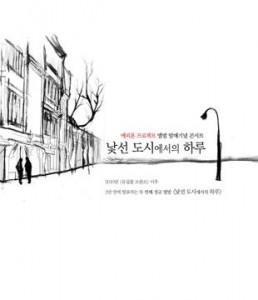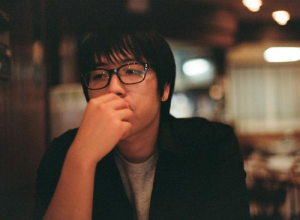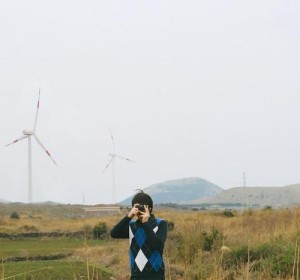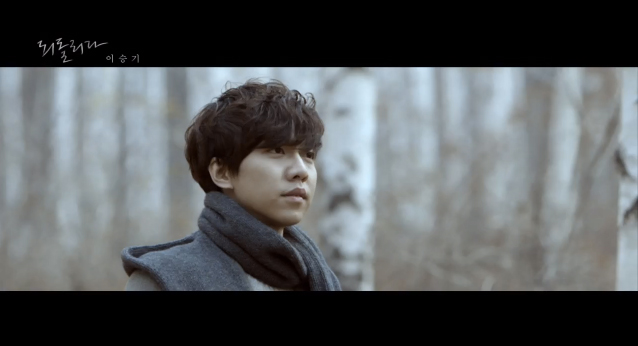 With all the excess and the enterprise of the idol scene in recent times, the simplicity demonstrated by acts in the indie scene is a complete breath of fresh air. Cha Se-jeong — better known as Epitone Project — exemplifies this simplicity with his amazing compositions. While Epitone Project has often worked with a variety of other acts including Sentimental Scenery, Lucia, and Taru, in his newest album, A Day in a Strange City, Epitone Project himself sings all of his self-composed songs which had its benefits and unfortunately, its downsides as well.
With all the excess and the enterprise of the idol scene in recent times, the simplicity demonstrated by acts in the indie scene is a complete breath of fresh air. Cha Se-jeong — better known as Epitone Project — exemplifies this simplicity with his amazing compositions. While Epitone Project has often worked with a variety of other acts including Sentimental Scenery, Lucia, and Taru, in his newest album, A Day in a Strange City, Epitone Project himself sings all of his self-composed songs which had its benefits and unfortunately, its downsides as well.
Epitone Project is known for his amazing work with instrumentals, specifically with his magic with the piano. This definitely shows with this album, made evident right from the beginning with opening song “5122.” Featuring no vocals at all, the piece starts off with a gorgeous piano solo and gets added onto with other instruments. The opening track helped set the entire mood for the album, which — as the album title suggests — carries a whimsical and longing feel throughout.
 The next track, “Now From Here” picks up the pace a bit and we hear Epitone Project’s light and almost whisper-like voice for the first time. This track features a lot of interesting sounds, mainly percussion, that helped give the song an airy and delicateness to it. The next track, “Parallax,” transitions very smoothly from the previous. Consisting of distinct woodwind instruments that is later added onto with acoustic guitar and other string instruments, once again the instruments are able to compliment Epitone Project’s breathy tone. But while both tracks were able pleasant to listen to, Epitone’s Project’s delivery was a bit lacking. While his voice was complimented by his wise choice of instrumentals, his voice lacked a bit of depth and expressiveness.
The next track, “Now From Here” picks up the pace a bit and we hear Epitone Project’s light and almost whisper-like voice for the first time. This track features a lot of interesting sounds, mainly percussion, that helped give the song an airy and delicateness to it. The next track, “Parallax,” transitions very smoothly from the previous. Consisting of distinct woodwind instruments that is later added onto with acoustic guitar and other string instruments, once again the instruments are able to compliment Epitone Project’s breathy tone. But while both tracks were able pleasant to listen to, Epitone’s Project’s delivery was a bit lacking. While his voice was complimented by his wise choice of instrumentals, his voice lacked a bit of depth and expressiveness.
Following “Parallax” is “The Next Morning,” a duet with Han Hee-jung. The voices of Epitone Project and Han Hee-jung were both able to complement each other well, though there were also moments where Han Hee-jung overpowered Epitone Project’s more somber voice. But other than that, “The Next Morning” was a haunting piece that was able to showcase the voices of Epitone Project and Han Hee-jung well. The next track of the album is “Dawn.” In this track, Epitone Project took on a stronger and more stable tone and was able to emote better. That and the marvelous use of piano made this a memorable piece and one of the more noteworthy songs of the album. Accompanying “Dawn” is a music video with some amazing visuals, and while it focused on simplicity, it was able to carry the mood set by the song.
[youtube http://www.youtube.com/watch?v=rAXbmSDG-_M&w=560&h=315]“Easy Flight” comes next. While not necessarily filler, the track as a whole is somewhat forgettable. It features sounds and a mood similar to “Now From Here,” only with more highlighted acoustic guitar that, while pleasant, generally wasn’t as provoking. What was more memorable and thought provoking, however, was following track “Cross-Border Train.” Similar to “5122,” this track features no vocals and instead relies on instrumentals to carry it. Overall an intriguing piece, the percussion and other quirky sounds was able to capture and replicate the rustle and bustle of a train station. The lack of vocals allowed the listener to open up their imagination a bit more and picture themselves in the train station, hearing sounds from people moving about to announcements to the trains themselves which are actually expressed very accurately and creatively within the instrumental. Next track, “Go” was carried by the effective use of the piano, starting and ending the song with a brilliant solo. The bridge of the song was also especially powerful and Epitone Project’s vocal performance was acceptable as well.
 The following tracks, “I’ll Believe” and “Our Music” were the album’s strongest. Epitone Project’s delivery is the strongest for these two songs as he was able to properly emote the lyrics effectively, a feat he was unable to do as well with the other songs of the album. “Our Music” was able to carry a sense melancholy to it while a lone piano takes up the majority of the instrumental. It was simple yet effective, which is probably the main charm of it. The entire album reached its climax with “I’ll Believe” which showcased a particularly epic instrumental, especially toward the end. In contrast, this song had a intensity to it that stood out from the entire album, easily becoming a highlight. The composition of this song was brilliant and the execution was not too shabby either, with the song able to tug hearts.
The following tracks, “I’ll Believe” and “Our Music” were the album’s strongest. Epitone Project’s delivery is the strongest for these two songs as he was able to properly emote the lyrics effectively, a feat he was unable to do as well with the other songs of the album. “Our Music” was able to carry a sense melancholy to it while a lone piano takes up the majority of the instrumental. It was simple yet effective, which is probably the main charm of it. The entire album reached its climax with “I’ll Believe” which showcased a particularly epic instrumental, especially toward the end. In contrast, this song had a intensity to it that stood out from the entire album, easily becoming a highlight. The composition of this song was brilliant and the execution was not too shabby either, with the song able to tug hearts.
The following tracks, “Terminal” and “Minuet” are able to clean up the album neatly, slowing down after the climax that was “I’ll Believe.” “Terminal,” carried by a warm acoustic guitar, was able to express transition and aftermath very well, and intensified toward the end. “Minuet” was a very pleasing conclusion. Once again an instrumental piece, “Minuet” started off with the beginning of “5122” and expanded on it as if to tie the entire album together, which it did very nicely.
 Overall, A Day in a Strange City was formatted very similarly as a story with exposition that was able to set the mood of the album, rising action, a distinct climax, falling action, and a very pleasing resolution. Similar to many stories, the end of this album is more noteworthy than the beginning. While the feeling of being in a strange city alluded by the album title wasn’t present in all of the songs, a feeling of longing and nostalgia was present and expressed throughout, tying the piece together. The brief moments featuring city sounds in a few of the songs’ introductions (“Parallax” and “Cross-Border Train”) were nice touches that alluded to the title and actually contributed to the songs’ mood as well.
Overall, A Day in a Strange City was formatted very similarly as a story with exposition that was able to set the mood of the album, rising action, a distinct climax, falling action, and a very pleasing resolution. Similar to many stories, the end of this album is more noteworthy than the beginning. While the feeling of being in a strange city alluded by the album title wasn’t present in all of the songs, a feeling of longing and nostalgia was present and expressed throughout, tying the piece together. The brief moments featuring city sounds in a few of the songs’ introductions (“Parallax” and “Cross-Border Train”) were nice touches that alluded to the title and actually contributed to the songs’ mood as well.
The instrumentals of this album, while pleasant and effective, was not as effective as Epitone Project’s previous work. Listening to his previous compositions, the use of piano was present throughout and was effectively used at that. This album features notably less use of piano in trade of the use of acoustic guitar. While the guitar was able to give the album a sense of warmth, Epitone Project is, in all, more skilled and effective with the piano. The pieces that actually included piano in this album were the strongest simply because they were slightly more intriguing and provoking. It’s evident that Epitone Project was experimenting a bit with his sound for this album, and experimentation is very much appreciated, but this writer feels that it didn’t pay off as much as it could have. Furthermore, Epitone Project’s emoting in this album really needed a bit of work. While none of his pieces are particularly weak, they could have been stronger had a more emotive singer sang them.
Ultimately, while the emotional delivery of this album was a bit lacking, the brilliant composition and the effective use of instrumentals more than made up for it. All in all, I give Epitone Project’s A Day in a Strange City a 4.6/5. What do you think Seoulmates? What do you think of Epitone Project’s A Day in a Strange City?
(Korean Indie, last.fm, Naver, Hyang Music, 2cinquesette , pastelmusic)


